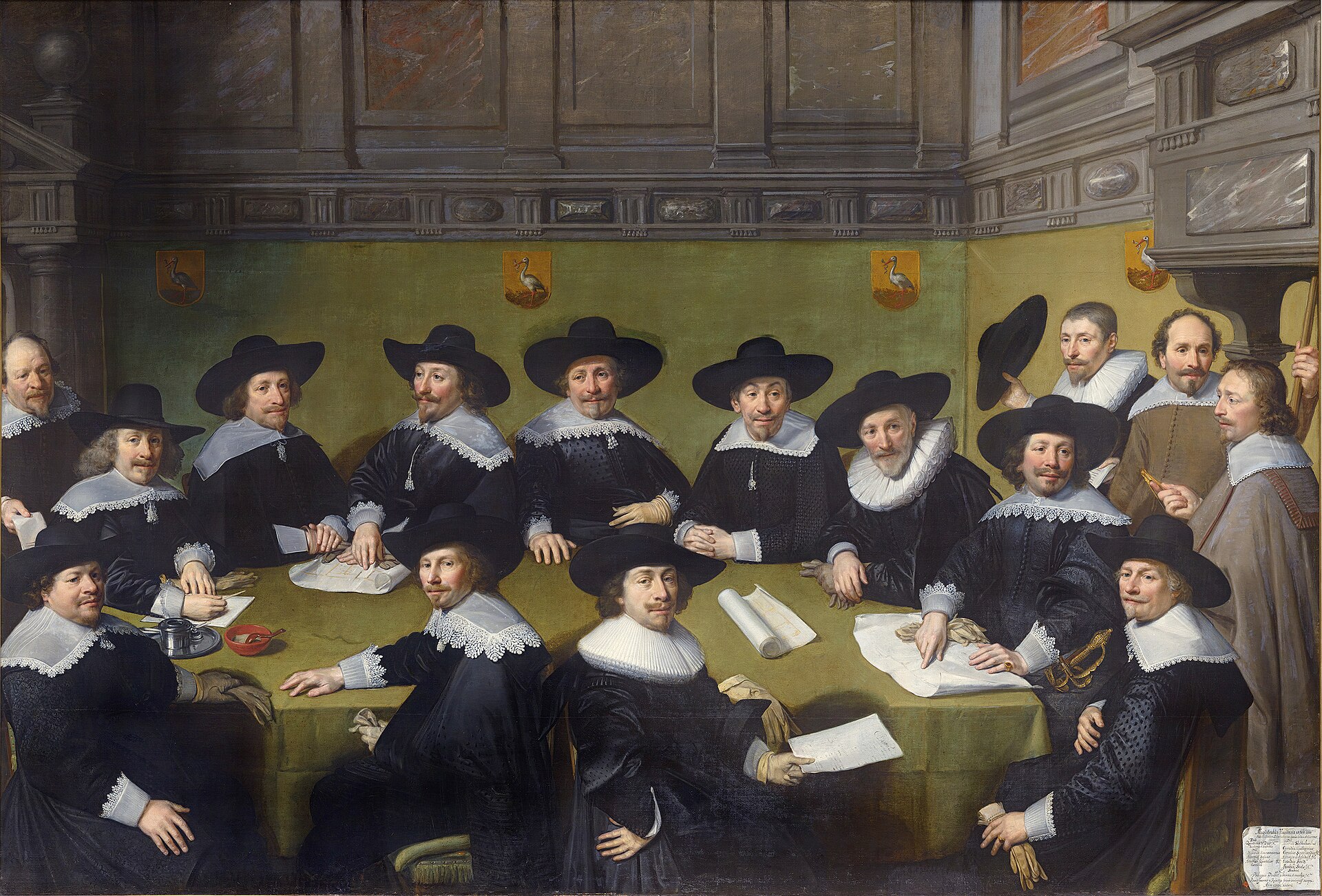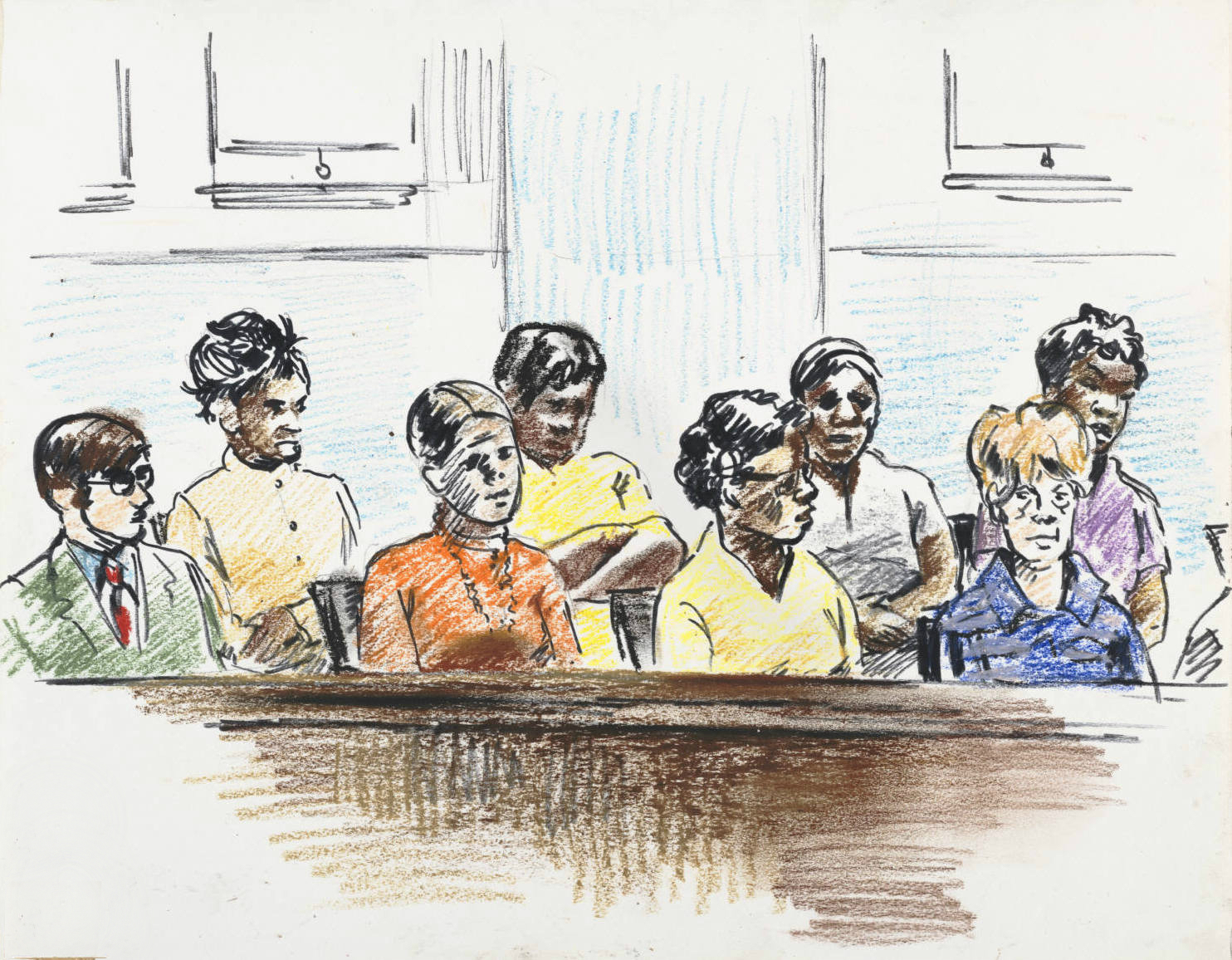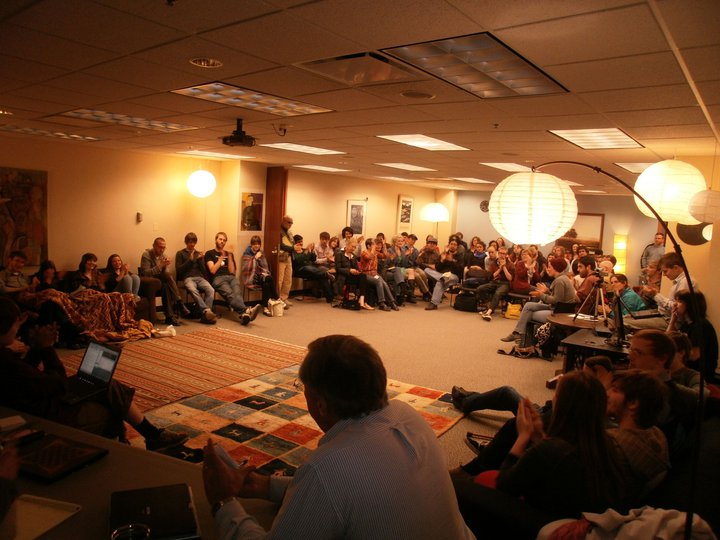
熟議
Deliberation
The city council of The Hague deliberating the rebuilding of the Sebastiaansdoelen in 1636 with the officers of the St. Sebastian militia. by Jan van Ravesteyn
☆この項目では"Deliberation"を「熟議」と訳している。
☆熟議とは、例えば投票前に選択肢を慎重に検討する思考プロセスである。熟議は力関係や創造性、対話ではなく、論理と理性の活用を重視する。集団の決定は通常、熟議を経て投票や関係者の合意によって下される。
法廷では陪審員が熟議を行うことで有名だ。陪審員には有罪か無罪かといった特定の選択肢と、評価のための情報・論拠が与えられるからだ。「熟議民主主義」では、選出された公職者と一般市民の双方が、投票の根拠として権力闘争ではなく熟議を用いることを目指す。
個人の熟議とは、日常的な合理的な意思決定の過程を指す言葉でもある。その意味で、これは認識論的な美徳と言える。
| Deliberation is a
process of thoughtfully weighing options, for example prior to voting.
Deliberation emphasizes the use of logic and reason as opposed to
power-struggle, creativity, or dialogue. Group decisions are generally
made after deliberation through a vote or consensus of those involved. In legal settings a jury famously uses deliberation because it is given specific options, like guilty or not guilty, along with information and arguments to evaluate. In "deliberative democracy", the aim is for both elected officials and the general public to use deliberation rather than power-struggle as the basis for their vote. Individual deliberation is also a description of day-to-day rational decision-making, and as such is an epistemic virtue. |
熟議とは、例えば投票前に選択肢を慎重に検討する思考プロセスである。 熟議は力関係や創造性、対話ではなく、論理と理性の活用を重視する。集団の決定は通常、熟議を経て投票や関係者の合意によって下される。 法廷では陪審員が熟議を行うことで有名だ。陪審員には有罪か無罪かといった特定の選択肢と、評価のための情報・論拠が与えられるからだ。「熟議民主主義」 では、選出された公職者と一般市民の双方が、投票の根拠として権力闘争ではなく熟議を用いることを目指す。 個人の熟議とは、日常的な合理的な意思決定の過程を指す言葉でもある。その意味で、これは認識論的な美徳と言える。 |
Trial juries A jury In countries with a jury system, the jury's deliberation in criminal matters can involve both rendering a verdict and determining the appropriate sentence. In civil cases, the jury decision is whether to agree with the plaintiff or the defendant and rendering a resolution binding actions by the parties based on the results of the trial. Typically, a jury must come to a unanimous decision before it delivers a verdict; however, there are exceptions. When a jury does not reach a unanimous decision and does not feel it is possible to do so, they declare themselves a "hung jury", a mistrial is declared, and the trial will have to be redone at the discretion of the plaintiff or prosecutor. One of the most famous dramatic depictions of this phase of a trial in practice is the film 12 Angry Men. |
陪審員 陪審 陪審制度を採用する国では、刑事事件における陪審の熟議は、評決を下すことと適切な刑罰を決定することの両方を含む場合がある。民事事件では、陪審の決定は原告または被告の主張を認めるか否かであり、裁判の結果に基づいて当事者の行動を拘束する解決策を提示する。 通常、陪審は評決を下す前に全員一致の決定に達しなければならない。ただし例外もある。陪審員が全員一致の決定に至らず、かつその可能性がないと判断した 場合、彼らは「陪審員が意見一致に至らない状態(hung jury)」を宣言する。これにより裁判は無効となり、原告または検察官の裁量で裁判をやり直す必要がある。 この裁判段階の実情を描いた最も有名な劇的作品の一つが、映画『十二人の怒れる男』である。 |
In political philosophy Shimer College Assembly deliberation In political philosophy, there is a wide range of views regarding how political deliberation becomes possible within particular governmental regimes. Political philosophy embraces deliberation alternatively as a crucial component or as the death-knell of democratic systems. Contemporary democratic theory contrasts democracy with authoritarian regimes. This leads to differing definitions of deliberation within political philosophy. In a broad sense, deliberation involves interaction guided by specific norms, rules, or boundaries. Deliberative ideals often include "face-to-face discussion, the implementation of good public policy, decision making competence, and critical mass."[1]: 970 The origins of philosophical interest in deliberation can be traced to Aristotle's concept of phronesis, understood as "prudence" or "practical wisdom", and its exercise by individuals who deliberate in order to discern the positive or negative consequences of potential actions.[2] Many modern political philosophers believe that strict norms, rules, or fixed boundaries either in how subjects eligible for political deliberation are formed (John Rawls) or in the types of qualifying arguments (Jürgen Habermas) can hinder deliberation and render it unfeasible. "Existential deliberation" is a term introduced by emotional public sphere theorists. They argue that political deliberation is an inherent state, not a deployable process. Therefore, deliberation is infrequent and possibly occurs only in face-to-face interactions. This concept aligns with radical deliberation insights, suggesting that politics emerges sporadically as potential within an otherwise inert social environment.[citation needed] "Pragmatic deliberation" represents the epistemic variation of existential deliberation, focusing on assisting groups in achieving positive outcomes that both aggregate and reshape the perspectives of the affected public.[citation needed] Advocates of "public deliberation" as an essential democratic practice focus on processes of inclusiveness and interaction in making political decisions. The validity and reliability of public opinion improve with the development of "public judgment" as citizens consider multiple perspectives, weigh possible options, and accept the outcomes of decisions made together.[3] |
政治哲学において シマー・カレッジ議会における熟議 政治哲学においては、特定の政府体制内で政治的熟議がどのように可能となるかについて、幅広い見解が存在する。政治哲学は熟議を、民主主義体制の重要な構 成要素として捉えるか、あるいはその終焉を告げるものとして捉えるかのいずれかである。現代の民主主義理論は民主主義と権威主義体制を対比させる。これに より政治哲学内での熟議の定義は異なるものとなる。広義において、熟議とは特定の規範・規則・境界線に導かれた相互作用を意味する。熟議の理想には「対面 での議論、良質な公共政策の実施、意思決定能力、そして臨界質量」が含まれることが多い[1]: 970 熟議に対する哲学的関心の起源は、アリストテレスの「フロンエシス」概念に遡る。これは「慎重さ」あるいは「実践的知恵」と解釈され、潜在的な行動の肯定的・否定的な結果を見極めるために熟議を行う個人による実践を指す[2]。 多くの現代政治哲学者は、厳格な規範・規則・固定境界が、政治的熟議の対象形成(ジョン・ロールズ)あるいは適格な議論の種類(ユルゲン・ハーバーマス)のいずれにおいても、熟議を阻害し実行不可能にすると考える。 「実存的熟議」は感情的公共圏理論家によって導入された用語である。彼らは政治的熟議は展開可能なプロセスではなく、内在的な状態だと主張する。したがっ て、熟議は稀であり、おそらく対面での相互作用においてのみ発生する。この概念は急進的熟議の洞察と一致し、政治はそれ以外では不活性な社会環境の中で潜 在性として散発的に出現すると示唆している。[出典が必要] 「実用的な熟議」は実存的熟議の認識論的変種を表し、影響を受ける公衆の視点を集約し再形成する肯定的成果をグループが達成することを支援することに焦点を当てる。[出典が必要] 「公共的熟議」を民主主義の本質的実践と位置付ける支持者は、政治的意思決定における包摂性と相互作用のプロセスを重視する。市民が複数の視点を検討し、 可能な選択肢を比較衡量し、共同で下した決定の結果を受け入れることで「公共的判断」が形成され、世論の妥当性と信頼性は向上する。[3] |
| Radical deliberation This section does not cite any sources. Please help improve this section by adding citations to reliable sources. Unsourced material may be challenged and removed. (July 2023) (Learn how and when to remove this message) Radical deliberation refers to a philosophical view of deliberation inspired by the events of the student revolution in May 1968. It aligns with political theories of radical democracy from figures like Michel Foucault, Ernesto Laclau, Chantal Mouffe, Jacques Rancière, and Alain Badiou. These theories emphasize political deliberation as a means of engaging diverse perspectives, setting the stage for political possibilities. In their view, radical democracy remains open-ended and susceptible to changes beyond individual influence. Instead, it's shaped by the discourse resulting from contingent gatherings within larger political entities. Michel Foucault employs "technologies of discourse" and "mechanisms of power" to explain how deliberation can be hindered or emerge through discourse technologies that give a semblance of agency by reproducing power dynamics among individuals. The concept of "mechanisms" or "technologies" presents a paradox. On one hand, these technologies are intertwined with the subjects who utilize them. On the other, discussing the coordinating machine or technology implies an infrastructure organizing society collectively. This notion suggests distancing individuals from the means of their organization, offering a god's-eye view of the social that is coordinated by the movement of its parts. Chantal Mouffe employs "the democratic paradox" to establish a self-sustaining political model founded on inherent contradictions. These unresolved contradictions fuel productive tensions among subjects who acknowledge each other's right to speak. According to Mouffe, the only stable political foundation is the configuration of the social and the certainty of a penultimate articulation's deferral[clarification needed]. This signifies that societal re-articulations will persist. Here, process prevails over content: the liberal/popular sovereignty paradox propels radical democracy. The rhetorical gesture of the foundational paradox[clarification needed] functions as a mechanism—an interface connecting human and language machinery, fostering the conditions for ongoing reconfiguration: a positive feedback loop within politics. Chantal Mouffe and Jacques Rancière hold contrasting views regarding the conditions of politics. For Mouffe, it involves internal rearrangements of existing social structures through "articulations". Conversely, Rancière sees it as the intrusion of an unaccounted-for externality. In the realm of political "arithmetical/geometric" distinctions, there's a clear nod to mechanics or mathematics. Politics endures by perpetuating a dynamic between homeostasis and reconfiguration, akin to what N. Katherine Hayles terms "pattern" and "randomness". This cycle relies on counting what's within the police order. The political mechanism facilitates future reconfigurations by adding new elements, reshaping the social fabric, and then returning to equilibrium, ensuring the perpetuity of an incomplete "whole". Once more, it's a rhetorical paradox driving politics—a foundational arbitrariness in determining who can speak and who can't. |
急進的熟議 この節は出典を一切示していない。信頼できる出典を引用してこの節を改善してほしい。出典のない記述は削除される可能性がある。(2023年7月)(このメッセージの削除方法と時期について) 急進的熟議とは、1968年5月の学生革命の出来事から着想を得た熟議に関する哲学的見解を指す。これはミシェル・フーコー、エルネスト・ラクラウ、シャ ンタル・ムフ、ジャック・ランシエール、アラン・バディウらによる急進的民主主義の政治理論と一致する。これらの理論は、多様な視点を交わす手段としての 政治的熟議を重視し、政治的可能性の基盤を築く。彼らの見解では、急進的民主主義は開放的なままであり、個人の影響を超えた変化を受けやすい。むしろ、よ り大きな政治的実体内の偶発的な集まりから生じる言説によって形作られる。 ミシェル・フーコーは「言説の技術」と「権力機構」を用いて、個人間の力学を再生産することで主体性の幻影を与える言説技術が、いかに熟議を阻害し、ある いは生み出すかを説明する。「機構」あるいは「技術」という概念は逆説を呈する。一方で、これらの技術はそれを利用する主体と密接に絡み合っている。他方 で、調整装置や技術について論じることは、社会を集団的に組織化する基盤を暗示する。この概念は、個人が自らの組織化手段から距離を置くことを示唆し、そ の構成要素の動きによって調整される社会を神の目線で捉える視座を提供する。 シャンタル・ムフは「民主主義のパラドックス」を用いて、内在的な矛盾に基づく自律的な政治モデルを確立する。これらの未解決の矛盾は、相互の発話権を認 める主体間の生産的な緊張を促進する。ムフによれば、唯一の安定した政治的基盤は、社会構成と「最終的な明確化」の延期[注釈必要]の確実性である。これ は社会的再構築が持続することを意味する。ここでは内容がプロセスに優先せず、リベラル/大衆主権のパラドックスが急進的民主主義を推進する。基礎的パラ ドックス[説明が必要]という修辞的ジェスチャーは、メカニズムとして機能する。人間と言語の機械を繋ぐインターフェースであり、継続的な再構成の条件を 育む。政治内部の正のフィードバックループである。 シャンタル・ムフとジャック・ランシエールは、政治の条件に関して対照的な見解を持つ。ムフにとってそれは、「言説化」を通じた既存社会構造の内部再編を 意味する。一方ランシエールは、説明不能な外部性の侵入と見る。政治的「算術的/幾何学的」区別の領域には、明らかに力学や数学への言及がある。政治は恒 常性と再構成の間の動的均衡を永続させることで存続する。これはN・キャサリン・ヘイルズが「パターン」と「ランダムネス」と呼ぶものに類似している。こ の循環は、警察秩序内の要素を数えることに依存する。政治的メカニズムは新たな要素を加え、社会構造を再形成し、均衡状態へ回帰することで将来の再構成を 可能にし、不完全な「全体」の永続性を保証する。ここでもまた、政治を駆動する修辞的パラドックス——誰が発言権を持ち誰が持たないかを決定する根源的な 恣意性——が存在する。 |
| Other theorists Giorgio Agamben – Italian philosopher (born 1942) Hannah Arendt – German-American historian and philosopher (1906–1975) Lauren Berlant – American academic and author (1957–2021) Bonnie Honig – American political theorist (born 1959) Bruno Latour – French philosopher, anthropologist and sociologist (1947–2022) |
その他の理論家 ジョルジョ・アガンベン – イタリアの哲学者(1942年生まれ) ハンナ・アーレント – ドイツ系アメリカ人の歴史家・哲学者(1906–1975) ローレン・バーラント – アメリカの学者・作家(1957–2021) ボニー・ホーニグ – アメリカの政治理論家(1959年生まれ) ブルーノ・ラトゥール – フランスの哲学者、人類学者、社会学者(1947–2022) |
| Argument map – Visual representation of the structure of an argument Blank pad rule – American legal doctrine and metaphor Dialogue mapping – Argumentation scheme Low-information rationality – Psychological problem-solving tendency Online deliberation |
議論マップ – 議論の構造を視覚的に表現したもの ブランクパッドの法則 – アメリカの法理論と隠喩 対話マッピング – 議論の枠組み 低情報合理性 – 心理的な問題解決傾向 オンライン熟議 |
| 1. Pedro, Portia (2010-02-01). "Note, Making Ballot Initiatives Work: Some Assembly Required". Harvard Law Review. 123 (4): 959. 2. Aristotle (2004-03-30). Tredennick, Hugh (ed.). The Nicomachean Ethics. Translated by Thomson, J.A.K. Penguin Classics. p. 209. ISBN 9780140449495. 3. Yankelovich, Daniel (1991-05-01). Coming to Public Judgment: Making Democracy Work in a Complex World (1st ed.). Syracuse University Press. ISBN 9780815602545. |
1. ペドロ、ポーシャ(2010年2月1日)。「注記:住民発議を機能させるために:組み立てが必要」。ハーバード・ロー・レビュー。123巻4号:959頁。 2. アリストテレス (2004-03-30). トレデンニック, ヒュー (編). 『ニコマコス倫理学』. トムソン, J.A.K. 訳. ペンギン・クラシックス. p. 209. ISBN 9780140449495. 3. ヤンケロヴィッチ、ダニエル(1991-05-01)。『公共判断の形成:複雑な世界における民主主義の機能』(初版)。シラキュース大学出版局。ISBN 9780815602545。 |
| https://en.wikipedia.org/wiki/Deliberation |
|
リ ンク
文 献
そ の他の情報
CC
Copyleft,
CC, Mitzub'ixi Quq Chi'j, 1996-2099